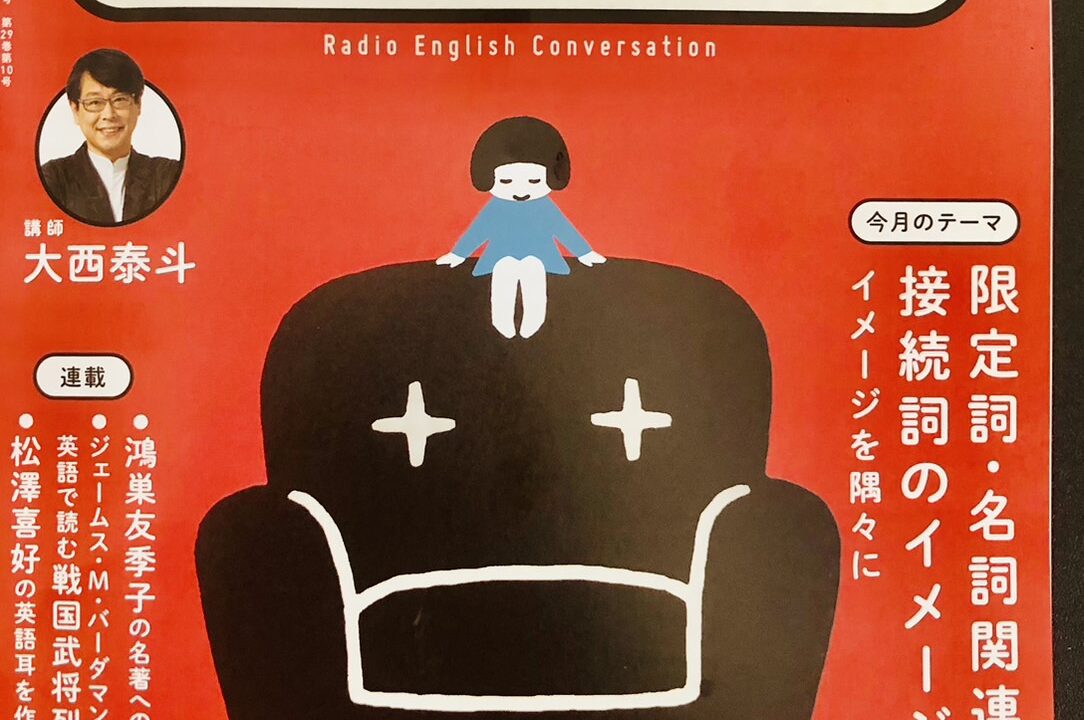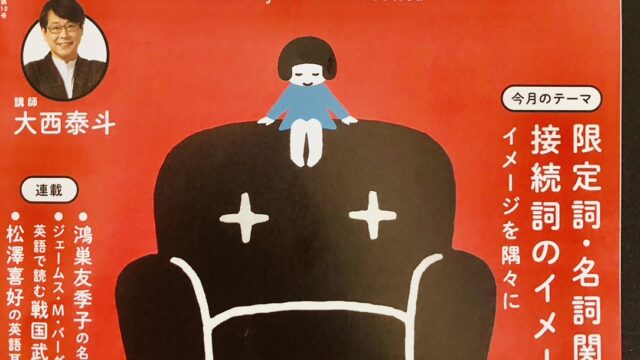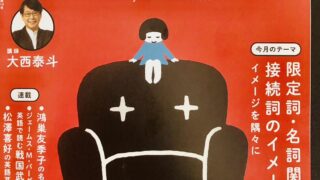January 12 Thursday, 2023
Lesson 189 it を使って強調する
☆Words & Phrases
**check ~ out:
**telescope:
Helen, check out my new telescope!
**impressive:
Very impressive. What are you looking at?
**view:
**Jupiter:
**moon:
I’m viewing the planet Jupiter. Look, you can see some of Jupiter’s moons through it.
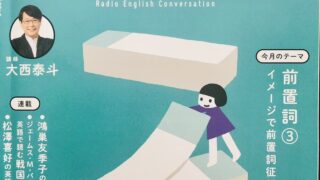
10gatsuEnglish
**incredible:
Oh, wow! I see them. That’s incredible!
**thank ~ for …:
**invent:
We have to thank Galileo for inventing the telescope, right?
**Dutch:
I read that it was a Dutch person that invented the telescope.
**until:
Really? I always thought it was Galileo that invented it. – So did I, until I read about it.
☆Grammar & Vocabulary
① What are you looking at ( )?
wh疑問文
欠けた情報を尋ねる疑問文。文中には尋ねたい箇所に空所 ( ) が置かれ、そこが疑問のターゲットとなる。
この文では at の後ろに名詞がなく空所となっている。「あなたは何を見ているのですか?」という意味。
前置詞の後ろに空所を置く wh疑問文を反射的に使うには慣れが必要。
② Look, you can see some of Jupiter’s moons through it.
視覚系動詞のイメージ
look と see という2つの視覚系動詞が使われている。
look「目を向ける」という動作
「見て」と命令文で、また What are you looking at? のように進行形で使うことも可能。
see「見える」は積極的な動作ではなく映像が向こうから入ってくる感触。そのため通常命令文で「見なさい」とは使えずまた進行形でも使われない。can see(見える)はよく使われるコンビネーション。
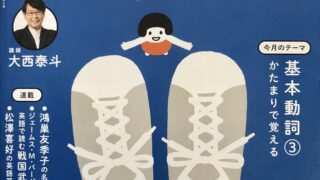


rainyjuneenglish
☆Key Sentence & Feel English
It was a Dutch person that ( ) invented the telescope.
この形は「itの強調構文」とも呼ばれているが、要するに「強調したい箇所を前に出して目立たせる」形。
この文内容は通常、
A Dutch person invented the telescope.
と言えば済むところを、it was を使って主語の a Dutch person を引っ張り出している。「オランダ人だったんだよ」と」始めれば、a Dutch person に大きな強調を与えることができる。
後は、何が a Dutch person なのかを that以下で展開するだけ。
① It was Mary that ( ) broke the kitchen window yesterday.
→ It was で Mary を文頭に出し that以下で説明する。Mary が元々あった主語の位置は空所 ( ) にし、何も入れない。空所になっているから Mary が主語であったことが分かる。
② It was the kitchen window that Mary broke ( ) yesterday.
→ It was で the kitchen window を文頭に出し、that以下で説明する。元々あった目的語の位置は空所 ( ) にしておく。
③ It was yesterday that Mary broke the kitchen window ( ).
→ It was で yesterday を文頭に出し、that以下で説明する。
☆Practice
C: Okay guys. It’s practice time!
Today we’re going to focus on the use of “it” when it’s used to emphasize the most important information that follows.
So it bangs! the most important information.
So let’s have a look at some examples.
R: And remember, it’s English you should be thinking in.
C: Here we go!
(It was Mary that broke the kitchen window yesterday.)
Of course, we can say “Mary broke the kitchen window yesterday.” But we want to pinpoint and emphasize “who it was.” so…
(It was Mary that broke the kitchen window yesterday.)
So with that emphasis, try after me.
……
R: Now let’s do an example where the kitchen window is the main point here, right? So we wanna emphasize the kitchen window.
It goes like this.
(It was the kitchen window that Mary broke yesterday.)
You see how changing the location makes it emphasized? Let’s try one more time.
……
C: Great! And the last one. We want to focus on “when this happened.” So Mary broke the kitchen window yesterday. But now we want to emphasize that so…
(It was yesterday that Mary broke the kitchen window.)
……
R: Excellent work, guys.
C: Well done.
☆Expression in Action
①ミシェルに花を送ったのはパトリックでした。
②パトリックがミシェルに送ったのは花でした。
③パトリックが花を送ったのはミシェルでした。
January 12 Thursday, 2023
Lesson 189 it を使って強調する
(日本語訳・解説付き)
☆Words & Phrases
**check ~ out: ~に注目する
**telescope: 望遠鏡
Helen, check out my new telescope!
ヘレン、私の新しい望遠鏡をよく見てよ!
※ check out にはもちろん、(ホテルなどを)チェックアウトする、調査する、清算する、等の意味もあります!
**impressive: 強い印象を与える、深い感銘を与える
Very impressive. What are you looking at?
とても素晴らしいです。あなたは何を見ているのですか?
**view: 見る、眺める
**Jupiter: 木星
**moon: 衛星、月
I’m viewing the planet Jupiter. Look, you can see some of Jupiter’s moons through it.
私は木星を見ています。ほら、それで木星の衛星がいくつか見えます。

10gatsuEnglish
**incredible: 素晴らしい、信じられない
Oh, wow! I see them. That’s incredible!
わあ、すごい!それらが見えます。素晴らしいわね。
**thank ~ for …: ~に…を感謝する
**invent: 発明する
We have to thank Galileo for inventing the telescope, right?
私たちは望遠鏡を発明したガリレオに感謝しなければいけませんね?
**Dutch: オランダ人、オランダの、オランダ語
I read that it was a Dutch person that invented the telescope.
私は望遠鏡を発明したのはオランダ人だったと読みました。
**until: ~まで(その時まで同じ状態が続く、の意味)
Really? I always thought it was Galileo that invented it. – So did I, until I read about it.
そうなの?私はそれを発明したのはガリレオだとずっと思っていました。 – 私もです、それを読むまでは。
※ So did I. So の後ろは主語と助動詞の倒置(did I)ですね。勢いのある「私もです」
☆Grammar & Vocabulary
① What are you looking at ( )?
あなたは何を見ているのですか?
wh疑問文
欠けた情報を尋ねる疑問文。文中には尋ねたい箇所に空所 ( ) が置かれ、そこが疑問のターゲットとなる。
この文では at の後ろに名詞がなく空所となっている。「あなたは何を見ているのですか?」という意味。
前置詞の後ろに空所を置く wh疑問文を反射的に使うには慣れが必要。
② Look, you can see some of Jupiter’s moons through it.
ほら、それで木星の衛星がいくつか見えます。
視覚系動詞のイメージ
look と see という2つの視覚系動詞が使われている。
look「目を向ける」という動作
「見て」と命令文で、また What are you looking at? のように進行形で使うことも可能。
see「見える」は積極的な動作ではなく映像が向こうから入ってくる感触。そのため通常命令文で「見なさい」とは使えずまた進行形でも使われない。can see(見える)はよく使われるコンビネーション。



rainyjuneenglish
☆Key Sentence & Feel English
It was a Dutch person that ( ) invented the telescope.
望遠鏡を発明したのはオランダ人でした。
この形は「itの強調構文」とも呼ばれているが、要するに「強調したい箇所を前に出して目立たせる」形。
この文内容は通常、
A Dutch person invented the telescope.
オランダ人は望遠鏡を発明しました。
と言えば済むところを、it was を使って主語の a Dutch person を引っ張り出している。「オランダ人だったんだよ」と」始めれば、a Dutch person に大きな強調を与えることができる。
後は、何が a Dutch person なのかを that以下で展開するだけ。
メアリーは昨日キッチンの窓を壊しました。
① It was Mary that ( ) broke the kitchen window yesterday.
昨日キッチンの窓を壊したのはメアリーだったのです。
→ It was で Mary を文頭に出し that以下で説明する。Mary が元々あった主語の位置は空所 ( ) にし、何も入れない。空所になっているから Mary が主語であったことが分かる。
② It was the kitchen window that Mary broke ( ) yesterday.
昨日メアリーが壊したのはキッチンの窓だったのです。
→ It was で the kitchen window を文頭に出し、that以下で説明する。元々あった目的語の位置は空所 ( ) にしておく。
③ It was yesterday that Mary broke the kitchen window ( ).
メアリーがキッチンの窓を壊したのは昨日だったのです。
→ It was で yesterday を文頭に出し、that以下で説明する。
☆Practice
C: Okay guys. It’s practice time!
Today we’re going to focus on the use of “it” when it’s used to emphasize the most important information that follows.
So it bangs! the most important information.
So let’s have a look at some examples.
R: And remember, it’s English you should be thinking in.
C: Here we go!
(It was Mary that broke the kitchen window yesterday.)
Of course, we can say “Mary broke the kitchen window yesterday.” But we want to pinpoint and emphasize “who it was.” so…
(It was Mary that broke the kitchen window yesterday.)
So with that emphasis, try after me.
……
R: Now let’s do an example where the kitchen window is the main point here, right? So we wanna emphasize the kitchen window.
It goes like this.
(It was the kitchen window that Mary broke yesterday.)
You see how changing the location makes it emphasized? Let’s try one more time.
……
C: Great! And the last one. We want to focus on “when this happened.” So Mary broke the kitchen window yesterday. But now we want to emphasize that so…
(It was yesterday that Mary broke the kitchen window.)
……
R: Excellent work, guys.
C: Well done.
☆Expression in Action
①ミシェルに花を送ったのはパトリックでした。
It was Patrick that ( ) sent flowers to Michelle.
②パトリックがミシェルに送ったのは花でした。
It was flowers that Patrick sent ( ) to Michelle.
③パトリックが花を送ったのはミシェルでした。
It was Michelle that Patrick sent flowers to ( ).
January 12 Thursday, 2023
Lesson 189 it を使って強調する
(日本語→英語バージョン)
☆Words & Phrases
**~に注目する:
**望遠鏡:
ヘレン、私の新しい望遠鏡をよく見てよ!
→
**強い印象を与える、深い感銘を与える:
とても素晴らしいです。あなたは何を見ているのですか?
→
**見る、眺める:
**木星:
**衛星、月:
私は木星を見ています。ほら、それで木星の衛星がいくつか見えます。
→

10gatsuEnglish
**素晴らしい、信じられない:
わあ、すごい!それらが見えます。素晴らしいわね。
→
**~に…を感謝する:
**発明する:
私たちは望遠鏡を発明したガリレオに感謝しなければいけませんね?
→
**オランダ人、オランダの、オランダ語:
私は望遠鏡を発明したのはオランダ人だったと読みました。
→
**~まで(その時まで同じ状態が続く、の意味):
そうなの?私はそれを発明したのはガリレオだとずっと思っていました。 – 私もです、それを読むまでは。
→
メアリーは昨日キッチンの窓を壊しました。
① 昨日キッチンの窓を壊したのはメアリーだったのです。
→ It was で Mary を文頭に出し that以下で説明する。Mary が元々あった主語の位置は空所 ( ) にし、何も入れない。空所になっているから Mary が主語であったことが分かる。
② 昨日メアリーが壊したのはキッチンの窓だったのです。
→ It was で the kitchen window を文頭に出し、that以下で説明する。元々あった目的語の位置は空所 ( ) にしておく。
③ メアリーがキッチンの窓を壊したのは昨日だったのです。
→ It was で yesterday を文頭に出し、that以下で説明する。

